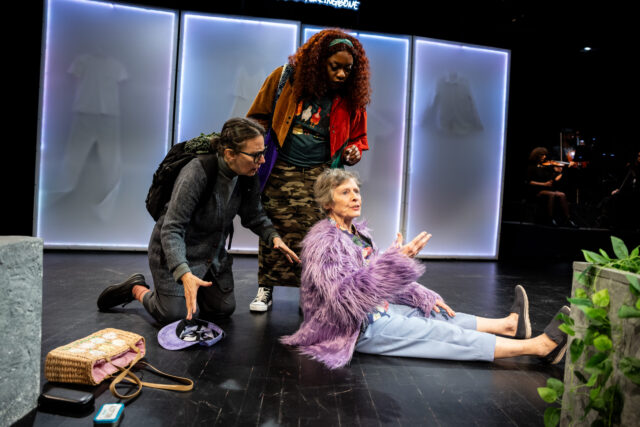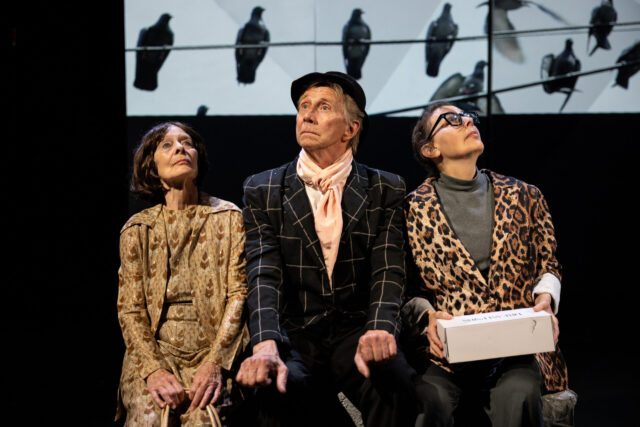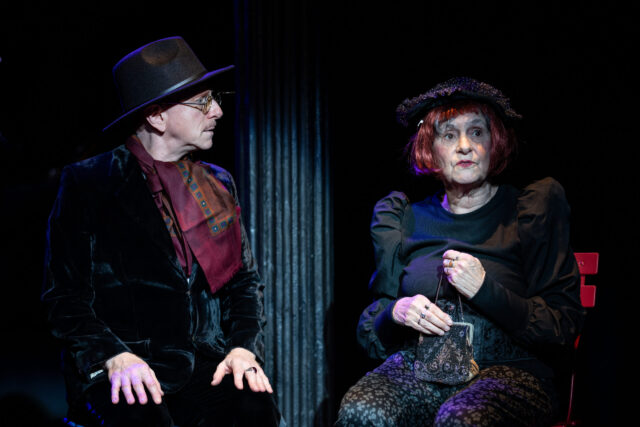
Fashion takes center stage at Talking Band’s Shimmer and Herringbone (photo by Maria Baranova)
SHIMMER AND HERRINGBONE
Mabou Mines@122CC
150 1st Ave. at Ninth St.
Wednesday – Sunday through May 19, $35
talkingband.org
Amid the flurry of Broadway openings — no fewer than nineteen between March 7 and April 25, the cutoff to be eligible for the Tonys — you may have missed the celebratory event of the season, the fiftieth anniversary of Talking Band, the independent downtown company founded by Ellen Maddow, Paul Zimet, and Tina Shepard in 1974. The avant-garde troupe has staged more than sixty productions since 1975’s The Kalevala, and this year it has treated us to three exquisite new shows in a span of three months.
In February, TB presented the moving and intimate The Following Evening at PAC NYC, a collaboration with 600 Highwaymen that explored personal and professional legacy, starring real-life couples Abigail Browde and Michael Silverstone of 600 Highwaymen and Maddow and Zimet of TB. In March, Maddow, in her mid-seventies, and Zimet, in his early eighties, teamed up for the brilliant Existentialism at La MaMa, a dazzling meditation on aging.
TB concludes its unofficial trilogy with the hilariously inventive and profound Shimmer and Herringbone, which opened last night at Mabou Mines@122CC for a limited run through May 19.
In his 1905 short story “The Czar’s Soliloquy,” Mark Twain wrote, “As Teufelsdröckh suggested, what would man be — what would any man be — without his clothes? As soon as one stops and thinks over that proposition, one realizes that without his clothes a man would be nothing at all; that the clothes do not merely make the man, the clothes are the man; that without them he is a cipher, a vacancy, a nobody, a nothing.”
The ninety-minute Shimmer and Herringbone takes place in the titular clothing store, where a handful of oddball characters across three generations — old friends, former lovers, not-so-strangers — shop with the help of eclectic dressing room attendant Rhonda (Maddow), who shares tidbits of carefully phrased philosophy as they seek to change their clothes, their style, and, in several cases, their lives, to not be a nobody or a nothing.
When Rhonda asks one customer, “Did you find what you were looking for?,” she’s referring to more than just a new scarf or jacket.
She says to another shopper, “Where are you going, if you don’t mind my asking?,” a question that requires a bigger answer than the shoe department.

Melanie (Tina Shepard), Colin (Jack Wetherall), and Lilly (Lizzie Olesker) wonder about pigeons and life in world premiere play (photo by Maria Baranova)
At the beginning of the play, Lilly (Lizzie Olesker) and her daughter, the twentysomething Bree (Ebony Davis), find the elderly Melanie (Tina Shepard), who speaks in non sequiturs, facedown on the floor. Grace (Louise Smith) is a realtor who isn’t sure how she knows Colin (Jack Wetherall) and runs away when she sees Lilly, an ornithologist who is embarrassed that she doesn’t recognize Gus (James Tigger! Ferguson), who appears to know her very well.
As they slowly discover more about one another, the characters not only dig deep within themselves but try to understand how they are seen by others — and how they have changed over the years.
“I see this face and I wonder — could that be me?” Grace says, later adding, as only a real estate agent can, “My face is falling apart like an old house.”
Reaching out, Colin talks to Grace about the apartment where he’s lived for more than thirty years. “Suddenly, about a month ago, I woke up and everything looked drab, everything was in the wrong place. The rug that I inherited from my mother was tatty and raveled around the edges, the kitchen table was greasy, and my favorite chair looked like a toadstool with its undersides oozing toxins. It’s like I have changed, but my apartment is stubbornly, defiantly sitting in the past, and I can’t stand it,” he says. Grace responds, “That’s been happening to people a lot lately,” implicating the audience itself.
As the characters share stories from their past that often include details about what they were wearing at the time, Bree is having none of it. When Rhonda asks her, “Can I help you?,” the youngest member of the group quickly replies, “I don’t need help.” When her mother is considering whether she should return a shirt, Bree declares, “It’s just a blouse,” a phrase that sticks out like blasphemy.
Through it all, a string trio consisting of Rachel Feldhaus, Marija Kovacevic, and Agustin Uriburu performs in a far corner, sometimes adding soothing background music and sometimes playing to the characters, who sit down and watch them while having conversations.

Gus (James Tigger! Ferguson) and Rhonda (Ellen Maddow) find common ground through dress in Shimmer and Herringbone (photo by Maria Baranova)
Shimmer and Herringbone is another delightful triumph from Talking Band, reminiscent of its 2022 production Lemon Girls or Art for the Artless, which also featured Olesker, Shepard, Smith, Wetherall, and writer and composer Maddow and was directed by Zimet. The new piece is cowritten by Maddow and Zimet and directed by Zimet, in collaboration with costume designer Olivera Gajic, whose outfits nearly steal the show, from black leather and leopard print to fluffy slippers and feathery hats.
The narrative unfolds on Anna Kiraly’s cozy set, which is centered by four lighted dressing-room doors that the shoppers enter and exit and is also used for Kiraly’s projections of social media posts, images of clothing and the moon, abstract shapes, birds on a wire, and a short film. The soft lighting is by Mary Ellen Stebbins, with sweet and touching choreography by Sean Donovan. A kind of angel at a way station, Rhonda is often pushing along a mannequin or a rack of clothes that were rejected. The characters occasionally sit on concrete slabs like park benches at the front, almost touching the audience.
In addition to the classical music played by the string trio, there are pop songs and poetry, from Samuel Taylor Coleridge and Blue “Gene” Tyranny to the combo of Bruce Springsteen and Patti Smith. Gus, who fashions himself a literary junkie, references Chekhov, Dostoevsky, Woolf, Borges, Hemingway, and Kerouac as he morphs into James Joyce, who once wrote, “Mother is packing my new secondhand clothes. She prays now, she says, that I may learn in my own life and away from home and friends what the heart is and what it feels. Amen. So be it. Welcome, O life!”
The centerpiece of the show is ornithologist Lilly’s spark bird, the New York City pigeon. Also known as the Columba livia and the rock dove, the bird is not only ubiquitous — it’s believed there are about four million in the city, compared with nine million people — but it is hard for the average person to tell them apart. Human beings have the ability to choose clothing that can assist in defining who they are, both outside and inside, but pigeons don’t have that option. It’s even difficult to identify their gender, as Lilly notes, which becomes relevant late in the play.
At one point, Grace explains that part of her job is “staging” a house, evoking the staging of a play: cleaning it out from top to bottom, then painting the walls white and adding cream carpets and innocuous artworks, allowing the buyer to make it their own home. Each character entering Shimmer and Herringbone is like that plain house, ready to redecorate themselves in their own personal style.
When Bree sees Melanie dragging a large garbage bag, she asks her what’s in there. “Nothing,” Melanie answers. “Stuff that’s been clogging up my closets, burdening my soul for half a century.” How many of us would love to go through our closets and get rid of old clothes that feel like a burden?
“So you want to find something that reflects who you are,” Rhonda says to Grace, who is worried about suffering buyer’s remorse, as if a new outfit is as important as a new home.
Isn’t it?
[Mark Rifkin is a Brooklyn-born, Manhattan-based writer and editor; you can follow him on Substack here.]